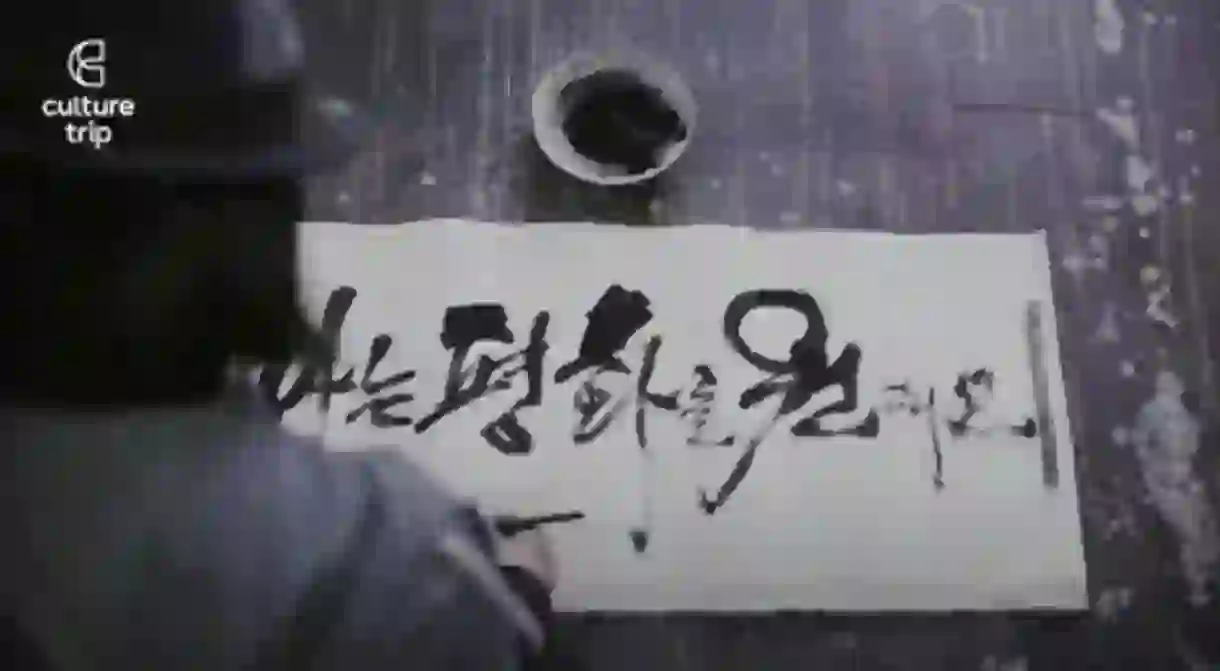Inside Sun Mu's Studio: From North Korean Propaganda to Satirical Art

Korean artist Sun Mu works from a modest studio on the outskirts of Seoul. Dozens of baseballs hang on strings from the ceiling — is he a fan? ‘No,’ he says, seriously. The balls symbolise his dream for Korean unity; two equal halves curl around each other to create a smooth, round globe.
‘Political unification, that’s not proper unification… when we meet, drink and work together, that’s when reunification takes place,’ Sun Mu says. After all, ‘how are we supposed to talk about reunification when we don’t even know each other?’

Early life in North Korea
Sun Mu was born in North Korea, where his artistic talent was recognised at a young age. As a child, he was picked to perform at Pyongyang Palace as part of the country’s annual New Year’s celebrations, where children sing, write, and paint for the North Korean leader. ‘I had seen those things, so I wanted to do it and please Kim Il Sung,’ he recalled. This was the start of his career, and led to his training as an artist there, where he painted posters in the regime’s socialist realist style.
Sun Mu was unusual amongst North Korean defectors, as he didn’t initially want to leave the country. Although everyday life required strict adherence to the government’s ideology, he believed in it. ‘If the system worked well, things would be great. There would be no taxes, no tuition fees, no unemployment,’ he said. Before leaving the country, Sun Mu was ‘ready to die’ for North Korea.

Stateless in China
But in the late 1990s, he was forced to defect. North Korea suffered a mass famine where, by some estimates, up to three million died from starvation. ‘I was sure I would die there’, Sun Mu said. He crossed the border into China. But being stateless proved difficult and the artist became involved with dangerous criminal gangs.
‘Living without a proper identity isn’t a good experience,’ Sun Mu said. ‘But in order to retain my identity, I would have had to go back to North Korea.’ Despite the dangers, he decided to move to Laos and then Thailand, escaping his gang’s house in the dead of night. Had he been caught, he would have been killed.
Growing up in North Korea, he was told that South Korea was highly Americanised, decadent and capitalistic. He was also told that the country was made up of tight-knit educational, regional and blood relationships – that it would be difficult for him to find acceptance. The decision to move to Seoul wasn’t an easy one, but Sun Mu was also aware that South Korea could give him the citizenship he needed.

Finally free?
After arriving in Seoul in 2002, Sun Mu continued to paint. He went back to college at the renowned Hongik University and majored in Arts. As he developed as a painter, he grew increasingly critical of North Korea. He subverted the propaganda style in which he was trained to create satirical works that mocked the regime’s ideology. In one painting, a podgy Kim Jong Un smiles as images of war are reflected in his gleaming sunglasses. In another, a sickly Kim Jong Il is offered Coca-Cola (a symbol of American capitalism) as medicine by a healthy young girl.
Given the controversial nature of his artwork, there are aspects of himself which he is unable to share. Sun Mu is not his real name — it’s a pseudonym, adopted to prevent reprisals against his family still living in North Korea. If one family member commits an offence against the state, the regime’s three-generation rule sees whole families punished. For the same reason, the artist does not show his face in public. ‘I show myself through my work,’ he says.

Though the punishment is less severe, the freedom Sun Mu has to express himself through art is still limited in South Korea. Under the country’s National Security Law, praising North Korea is a crime, and Sun Mu’s art has stoked controversy from the very beginning. When he celebrated the opening of his first exhibition, police arrived to investigate a complaint that his work was pro-North Korea. As similar complaints were made about subsequent exhibitions, regional police investigations became a fixture of the artist’s life.
While Sun Mu has built a new life in South Korea, some of his initial fears of living there have been confirmed. ‘I think [South Koreans] care too much about money,’ he reflects. The country’s high-powered, competitive economy and individualistic outlook on life has changed the subject of his art. Rather than painting propaganda for the North Korean regime, ‘I was advertising myself — self propaganda,’ Sun Mu reflected.

‘No Borders’
The complaints made against his work initially came as a surprise, spurring Sun Mu on to one of his biggest dreams. ‘The ideas of ordinary people were still in that Cold War ideology,’ he said. ‘We should move away from that ideology and create a society where we can talk.’ The artist sees communication not just as a means to reconciliation, but as an end in and of itself. Even his assumed name expresses a desire for unity — Sun Mu translates to ‘No Borders’.
Even though both countries have their own problems, Sun Mu’s overarching message is one of optimism. As well as the baseballs, all over his studio are flowers. The stalks are made of barbed wire from the demilitarised zone (DMZ) separating the two nations, to which Sun Mu has added yellow blossoms. The image symbolises renewal and hope for the future. Many of Sun Mu’s works feature children from the North and South playing hand in hand, in a show of the unity he desires. ‘Even though we’re different,’ Sun Mu says, ‘we can live with one another.’














